Puzzles help reduce anxiety symptoms by engaging your mind in a focused, calming activity. When you solve puzzles, your brain shifts attention from worries to problem-solving, activating the prefrontal cortex and reducing amygdala activity. This cognitive redirection promotes relaxation and releases dopamine, enhancing mood and motivation. The repetitive actions involved in puzzling can induce a meditative state, fostering mindfulness and present-moment awareness. Puzzles also provide a sense of control and accomplishment, boosting self-confidence and resilience. By stimulating neurotransmitter balance and improving cognitive flexibility, puzzle therapy offers both immediate relief and long-term benefits for managing anxiety. Discover how different types of puzzles can transform your anxiety management toolkit.
The Science Behind Puzzle Therapy
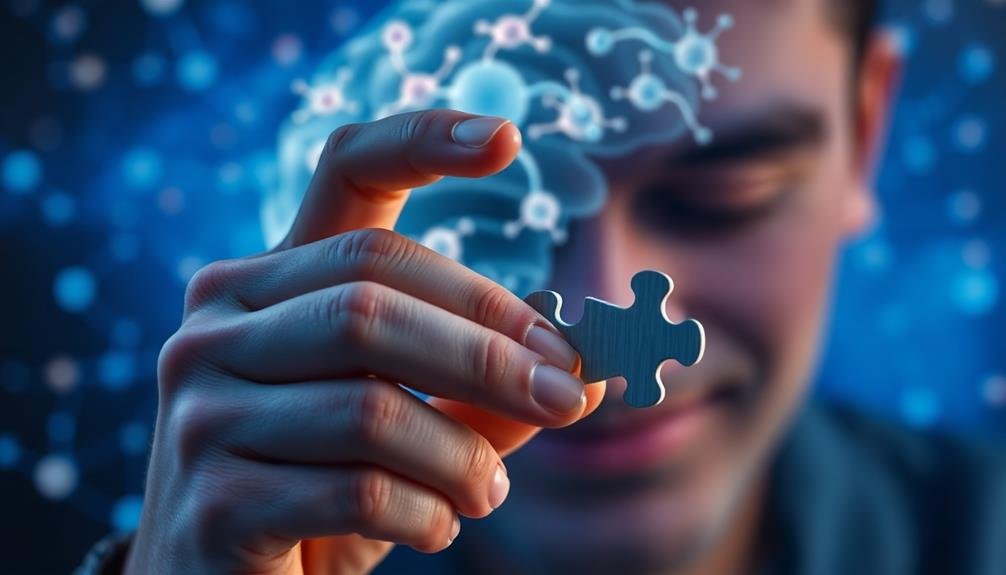
The science behind puzzle therapy reveals a fascinating interplay between cognitive engagement and stress reduction. When you engage in puzzle-solving activities, your brain shifts its focus from anxiety-inducing thoughts to the task at hand. This redirection activates the prefrontal cortex, responsible for problem-solving and decision-making, while simultaneously reducing activity in the amygdala, the brain's fear center.
As you work on puzzles, your brain releases dopamine, a neurotransmitter associated with pleasure and reward. This chemical surge creates a sense of accomplishment and motivation, counteracting the negative emotions often linked to anxiety.
Furthermore, puzzles promote a state of flow, where you're fully immersed in the activity, losing track of time and worries. Research has shown that puzzle therapy can lower cortisol levels, the body's primary stress hormone. This reduction in cortisol can lead to improved mood, better sleep, and a stronger immune system.
Additionally, the repetitive nature of many puzzles, such as jigsaw or crosswords, can induce a meditative state, further enhancing relaxation and mindfulness. By regularly engaging in puzzle activities, you're fundamentally training your brain to better manage stress and anxiety.
Mindfulness Through Puzzling
When you're engaged in solving a puzzle, you're naturally drawn into the present moment, focusing intently on the task at hand.
This present-moment focus can help quiet anxious thoughts about the past or future, allowing you to experience a sense of calm.
The repetitive actions often involved in puzzling, such as fitting pieces together or following patterns, can further enhance this calming effect, creating a meditative-like state.
Present-Moment Focus
Immersion in the present moment lies at the heart of puzzle-solving's anxiety-relieving power. When you engage with a puzzle, your mind naturally shifts its focus to the task at hand. You're no longer dwelling on past regrets or future worries; instead, you're fully absorbed in the present challenge.
This present-moment focus is a key component of mindfulness, a practice known for its stress-reducing benefits. As you work on a puzzle, you're actively practicing mindfulness without even realizing it. You're observing patterns, considering possibilities, and making decisions based on what's right in front of you.
The act of puzzling demands your full attention, leaving little room for anxious thoughts to creep in. You'll find yourself concentrating on fitting pieces together, decoding clues, or solving equations. This intense focus acts as a form of mental reset, giving your brain a break from anxiety-inducing thoughts.
Moreover, the tactile nature of many puzzles, like jigsaw or tangram puzzles, further anchors you in the present. You're physically interacting with the puzzle, which reinforces your connection to the current moment and helps ground you in reality.
Calming Repetitive Actions
Building on the concept of present-moment focus, many puzzles offer a unique form of mindfulness through calming repetitive actions. As you engage in activities like fitting jigsaw pieces together, solving crossword clues, or completing Sudoku grids, you're performing a series of small, repetitive tasks. These actions can have a soothing effect on your mind and body.
The rhythmic nature of puzzle-solving can help regulate your breathing and heart rate, promoting a sense of calm. You'll often find yourself naturally falling into a steady pace as you work through the puzzle, which can mimic the effects of meditation or deep breathing exercises. This repetitive process also encourages a state of flow, where you're fully absorbed in the task at hand.
Moreover, the predictable patterns in many puzzles provide a sense of control and order, which can be especially comforting during times of stress or uncertainty. As you repeat familiar actions, your brain releases neurotransmitters like dopamine and serotonin, further enhancing your mood and reducing anxiety symptoms.
Stress Reduction Mechanisms
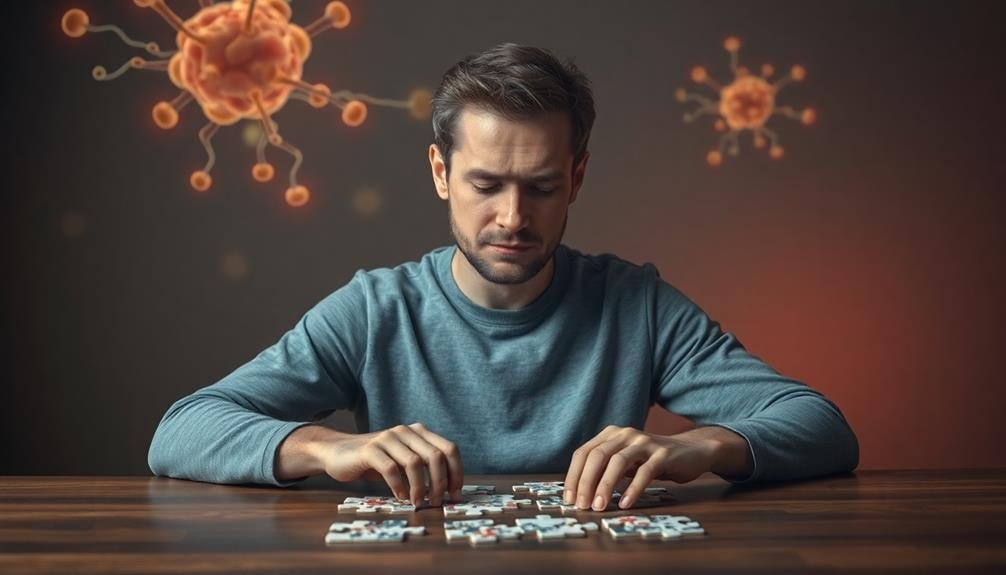
Relaxation lies at the heart of puzzle-solving's stress-reducing effects. When you engage in puzzles, your brain shifts focus from anxious thoughts to the task at hand. This cognitive redirection activates the parasympathetic nervous system, which counters the body's stress response. As you become absorbed in the puzzle, your breathing naturally slows, and muscle tension eases.
Puzzles also trigger the release of dopamine, a neurotransmitter associated with pleasure and reward. Each time you solve a part of the puzzle or complete it entirely, you experience a small dopamine rush. This not only feels good but also reinforces the stress-reducing behavior, encouraging you to return to puzzles in times of anxiety.
Moreover, puzzles provide a sense of control in an otherwise chaotic world. As you manipulate pieces or solve clues, you're creating order from disorder. This process can be especially soothing when you're feeling overwhelmed by life's uncertainties.
The structured nature of puzzles offers a temporary escape, allowing your mind to rest and reset, ultimately reducing overall stress levels.
Cognitive Benefits of Puzzle Solving
While stress reduction is a notable benefit of puzzle-solving, it's not the only way your brain reaps rewards from this activity. Engaging in puzzles regularly can greatly enhance your cognitive abilities. You'll find improvements in various mental processes, from problem-solving skills to memory retention.
When you tackle puzzles, you're exercising multiple brain functions simultaneously. This mental workout strengthens neural connections and promotes cognitive flexibility.
You'll notice enhanced:
- Critical thinking: You'll develop a more analytical approach to challenges
- Pattern recognition: Your ability to identify and understand complex patterns will improve
- Spatial reasoning: You'll become better at visualizing and manipulating objects in your mind
- Attention to detail: Your observational skills will sharpen, helping you notice subtle differences
These cognitive benefits extend beyond puzzle-solving sessions. You'll find yourself applying these enhanced skills in daily life, from work-related tasks to personal decision-making.
As you continue to challenge your brain with puzzles, you're not just reducing anxiety; you're also building a more resilient and adaptable mind, capable of tackling life's complexities with greater ease and confidence.
Types of Anxiety-Reducing Puzzles
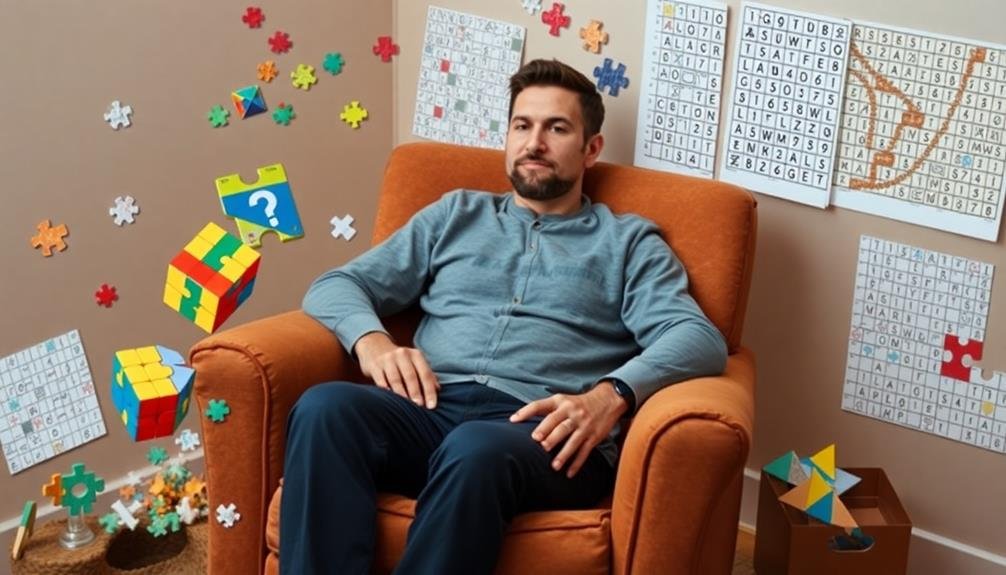
Now that we've explored the cognitive benefits, let's plunge into the various types of puzzles that can help alleviate anxiety. You'll find a wide range of options to suit your preferences and needs.
Jigsaw puzzles are a classic choice, offering a tactile experience that can be both challenging and soothing. They're great for promoting mindfulness and focus.
Crossword puzzles engage your verbal skills and memory, providing a mental workout that can distract from anxious thoughts.
Sudoku, with its logical number placement, can help calm your mind through structured problem-solving.
For a more artistic approach, try adult coloring books or paint-by-numbers. These activities combine creativity with structure, allowing you to express yourself while following guidelines.
If you prefer physical manipulation, Rubik's Cubes or tangrams can keep your hands busy and your mind engaged.
Digital options include brain-training apps and online puzzle games, which offer convenience and variety.
Don't forget about word searches, mazes, and logic puzzles – each type targets different cognitive skills while promoting relaxation.
Experiment with various puzzle types to find what works best for your anxiety relief.
Establishing a Puzzle Routine
Creating a consistent puzzle routine can greatly enhance the anxiety-relieving benefits of these activities. To establish an effective routine, set aside dedicated time each day for puzzle-solving. Choose a quiet, comfortable space where you can focus without distractions.
Start with shorter sessions and gradually increase the duration as you become more accustomed to the practice. Select puzzles that match your skill level and preferences. You'll find greater enjoyment and stress relief when you're not overwhelmed or bored.
Vary the types of puzzles you tackle to keep your mind engaged and prevent monotony. As you progress, challenge yourself with more complex puzzles to stimulate cognitive growth.
Consider incorporating your puzzle routine into your daily stress management strategy. You might:
- Begin your day with a quick crossword to jumpstart your brain
- Use jigsaw puzzles as a midday break to reset your focus
- Solve logic puzzles before bed to wind down
- Engage in group puzzle-solving sessions for social connection
Social Aspects of Puzzle Therapy
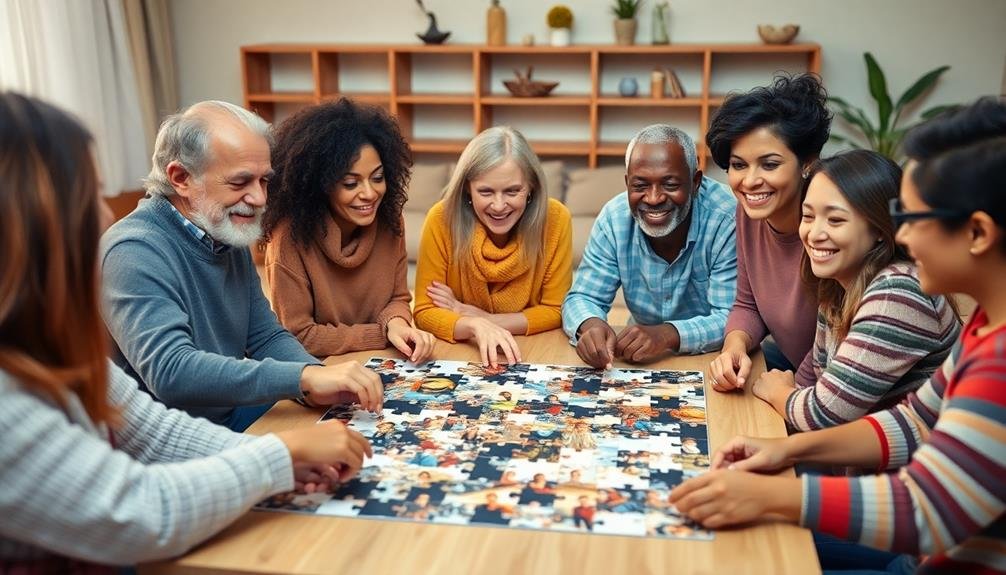
Puzzle therapy isn't just a solitary pursuit; it can be a social activity that amplifies its anxiety-reducing benefits. When you engage in puzzles with others, you're creating shared experiences and fostering connections. This social aspect can help combat feelings of isolation often associated with anxiety.
Group puzzle-solving encourages teamwork and communication. You'll find yourself discussing strategies, sharing insights, and celebrating small victories together. This collaborative environment can boost your confidence and provide a sense of belonging, which are essential for managing anxiety symptoms.
Puzzle clubs or game nights offer structured social interactions that may feel less overwhelming than other social settings. You're focused on a common goal, which can ease social pressure and provide a natural conversation starter. These gatherings also give you a regular opportunity to practice social skills in a low-stress environment.
Online puzzle communities can be especially beneficial if you struggle with in-person interactions. You can connect with fellow puzzle enthusiasts worldwide, share progress, and seek advice, all from the comfort of your home.
This virtual support network can provide encouragement and motivation, helping you maintain your puzzle therapy routine and manage anxiety more effectively.
Puzzles and Neurotransmitter Balance
While engaging in puzzles, your brain undergoes fascinating chemical changes that can help alleviate anxiety. As you focus on solving a puzzle, your brain releases neurotransmitters that promote a sense of calm and well-being.
Dopamine, the "feel-good" chemical, is released when you make progress or complete a puzzle, reinforcing positive emotions and motivation.
Serotonin, another vital neurotransmitter, increases during puzzle-solving activities. This boost in serotonin helps regulate mood and reduce anxiety symptoms.
Additionally, puzzles can stimulate the production of GABA (gamma-aminobutyric acid), a neurotransmitter that inhibits excessive brain activity and promotes relaxation.
The neurotransmitter balance achieved through puzzles offers several benefits:
- Improved mood and emotional stability
- Enhanced cognitive function and mental clarity
- Reduced stress and anxiety levels
- Increased resilience to daily challenges
Overcoming Anxiety With Jigsaw Puzzles
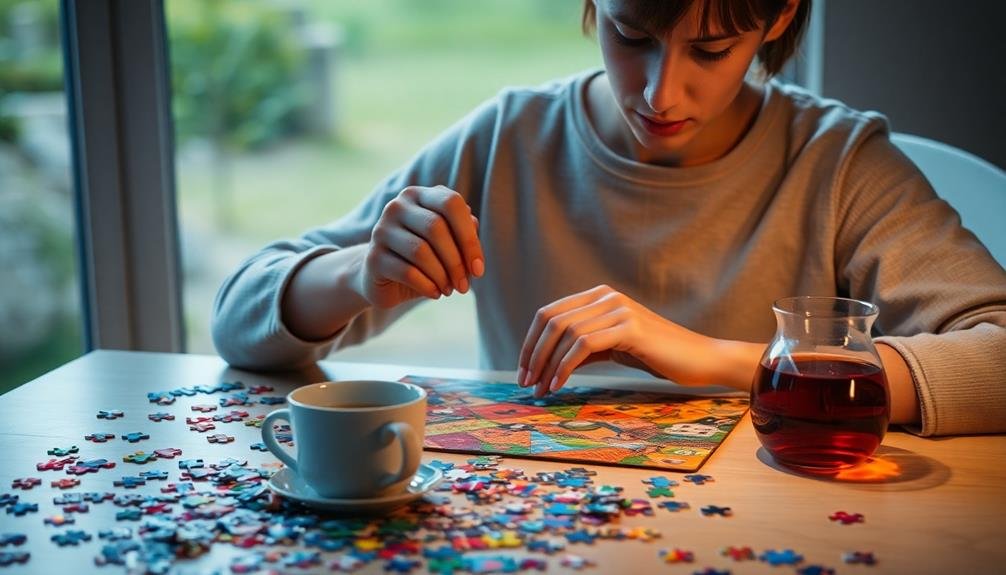
Among the various types of puzzles, jigsaw puzzles stand out as particularly effective for anxiety relief. When you engage with a jigsaw puzzle, you're immersing yourself in a task that requires focus and concentration. This immersion can help shift your mind away from anxious thoughts and worries, providing a much-needed mental break.
As you work on fitting pieces together, you're creating a sense of order and control. This process can be especially soothing when you're feeling overwhelmed by life's uncertainties. Each successful connection gives you a small dose of accomplishment, boosting your confidence and self-esteem.
Jigsaw puzzles also offer a tangible representation of progress. As the image slowly comes together, you can see your efforts paying off, which can be particularly rewarding for those struggling with anxiety. The methodical nature of puzzle-solving can help establish a calming routine, giving structure to your leisure time.
Moreover, jigsaw puzzles can be a social activity, allowing you to connect with others in a low-pressure environment. This social aspect can help combat feelings of isolation often associated with anxiety, providing a gentle way to interact and bond over a shared task.
Brain Teasers for Emotional Regulation
When you're feeling anxious, brain teasers can help you regulate your emotions by redirecting your focus to the present moment.
These cognitive distraction techniques pull your attention away from worries and onto the puzzle at hand.
Focusing on Present Moment
Brain teasers offer a powerful tool for focusing on the present moment and regulating emotions. When you engage with a puzzle, your mind becomes absorbed in the task at hand, effectively shutting out anxious thoughts about the past or future. This intense concentration creates a state of mindfulness, where you're fully present and aware of your current experiences.
As you work through a brain teaser, you'll notice that your attention narrows to the specific challenge before you. This shift in focus can help calm racing thoughts and reduce feelings of anxiety. The act of problem-solving requires your full mental engagement, leaving little room for worry or stress.
Puzzles promote present-moment awareness in several ways:
- They demand your immediate attention
- They provide instant feedback on your progress
- They create a sense of flow and timelessness
- They offer a tangible, achievable goal
Cognitive Distraction Techniques
Cognitive distraction techniques, like brain teasers, serve as powerful tools for emotional regulation. When you engage in puzzles or mental challenges, you're actively redirecting your thoughts away from anxious feelings. This shift in focus can help break the cycle of rumination that often accompanies anxiety.
Brain teasers and puzzles demand your full attention, making it difficult to dwell on worries or negative thoughts. As you work through a challenging puzzle, you're exercising your problem-solving skills and critical thinking abilities. This mental engagement not only distracts you from anxiety but also boosts your confidence as you make progress.
You'll find that these cognitive exercises come in various forms, from crossword puzzles and Sudoku to logic problems and riddles. Each type offers a unique way to challenge your mind and provide relief from anxious thoughts.
Mindfulness Through Problem-Solving
Beyond cognitive distraction, brain teasers offer a unique pathway to mindfulness. As you engage with puzzles, you're not just solving a problem; you're actively participating in a form of meditation. This problem-solving process requires your full attention, naturally drawing you into the present moment and away from anxious thoughts.
When you tackle a brain teaser, you're training your mind to:
- Focus on a single task
- Observe details without judgment
- Accept challenges without immediate solutions
- Cultivate patience and persistence
These skills mirror core principles of mindfulness practice. By regularly solving puzzles, you're inadvertently strengthening your ability to stay present and manage emotions effectively.
The act of problem-solving also promotes a state of flow, where you're fully immersed in the task at hand. This state can greatly reduce anxiety symptoms by providing a sense of control and accomplishment.
As you progress through increasingly complex puzzles, you're building resilience and confidence in your ability to overcome challenges. This newfound self-assurance can extend beyond puzzle-solving, helping you approach real-life problems with a calmer, more focused mindset.
Long-Term Effects on Anxiety Management

Regular puzzle-solving can have lasting benefits for anxiety management. As you consistently engage in puzzles, you're training your brain to approach problems methodically, which can translate to how you handle anxiety-inducing situations.
You'll find yourself better equipped to break down complex issues into manageable parts, reducing overwhelming feelings. Over time, you'll develop improved concentration and focus, allowing you to redirect your thoughts from anxious ruminations to productive problem-solving.
This skill becomes ingrained, helping you manage anxiety even when you're not actively solving puzzles. You'll also experience increased self-confidence as you successfully complete puzzles, boosting your overall resilience to stress.
The cognitive flexibility you gain from puzzle-solving enhances your ability to adapt to unexpected situations, a vital skill for managing anxiety. You'll become more patient and persistent, qualities that serve you well when facing long-term anxiety challenges.
Additionally, the sense of accomplishment you get from puzzles can improve your mood and outlook, creating a positive feedback loop that further reduces anxiety symptoms. Ultimately, incorporating puzzles into your routine can lead to sustainable improvements in your anxiety management skills.
Frequently Asked Questions
Can Puzzles Replace Medication for Anxiety Disorders?
You shouldn't replace prescribed anxiety medication with puzzles. While puzzles can help manage symptoms, they're not a substitute for professional treatment. Always consult your doctor before making changes to your anxiety management plan. Puzzles can complement, not replace, medication.
Are There Age Restrictions for Using Puzzles as Anxiety Therapy?
You'll find puzzles can be used as anxiety therapy at any age. There aren't strict restrictions, but it's important to choose age-appropriate puzzles. Young children and older adults may need simpler puzzles tailored to their abilities.
How Quickly Can One Expect to See Results From Puzzle Therapy?
You'll likely notice a calming effect immediately when doing puzzles. However, for long-term anxiety reduction, you should engage in puzzle therapy regularly. You may see significant improvements in your symptoms within a few weeks of consistent practice.
Do Digital Puzzles Offer the Same Anxiety-Reducing Benefits as Physical Ones?
You'll find digital puzzles can offer similar anxiety-reducing benefits as physical ones. They engage your mind, promote focus, and provide a sense of accomplishment. However, you might miss out on the tactile experience physical puzzles offer.
Are There Any Potential Negative Effects of Using Puzzles for Anxiety Management?
While puzzles can help manage anxiety, you shouldn't rely on them exclusively. You might become overly dependent, neglecting other coping strategies. Excessive puzzling could also lead to frustration or procrastination, potentially worsening your anxiety if you're not careful.
In Summary
You've discovered the power of puzzles in managing anxiety. By engaging your mind and hands, you're creating a mindful escape from worry. As you solve each challenge, you're boosting your confidence and rewiring your brain for calm. Remember, puzzle therapy isn't just a distraction—it's a tool for long-term anxiety management. So next time you're feeling overwhelmed, reach for a puzzle. It's a simple, enjoyable way to reduce stress and improve your mental well-being.

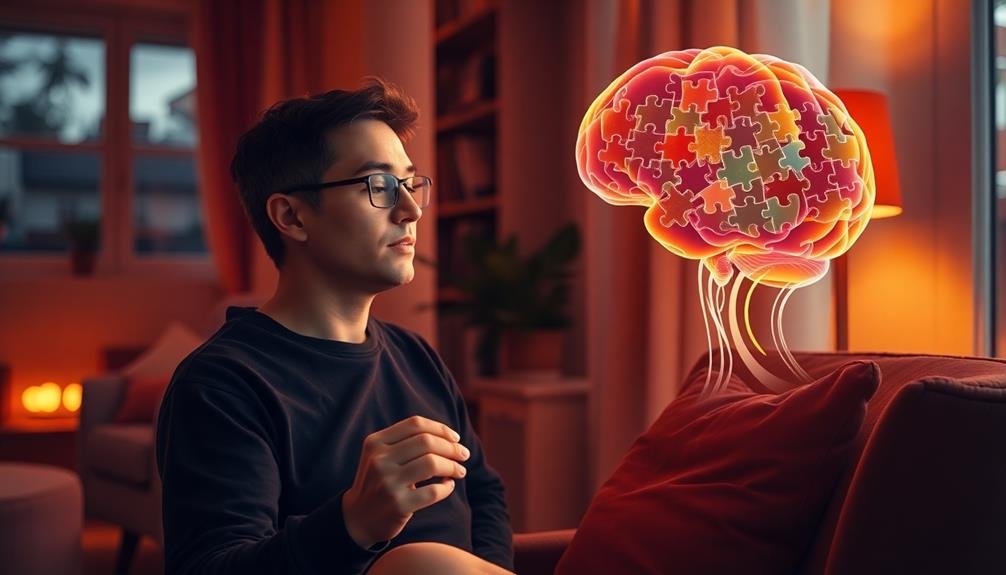

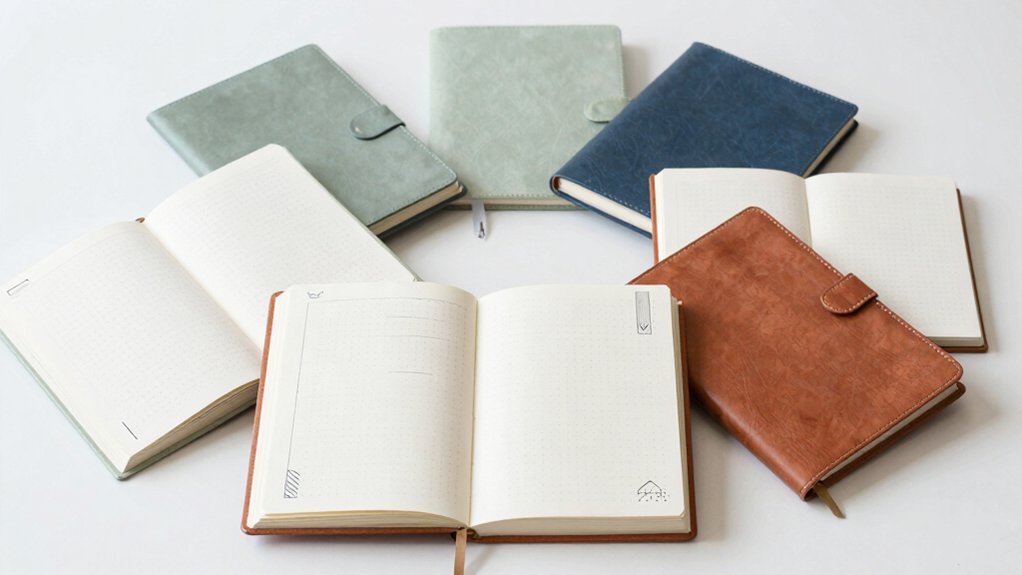
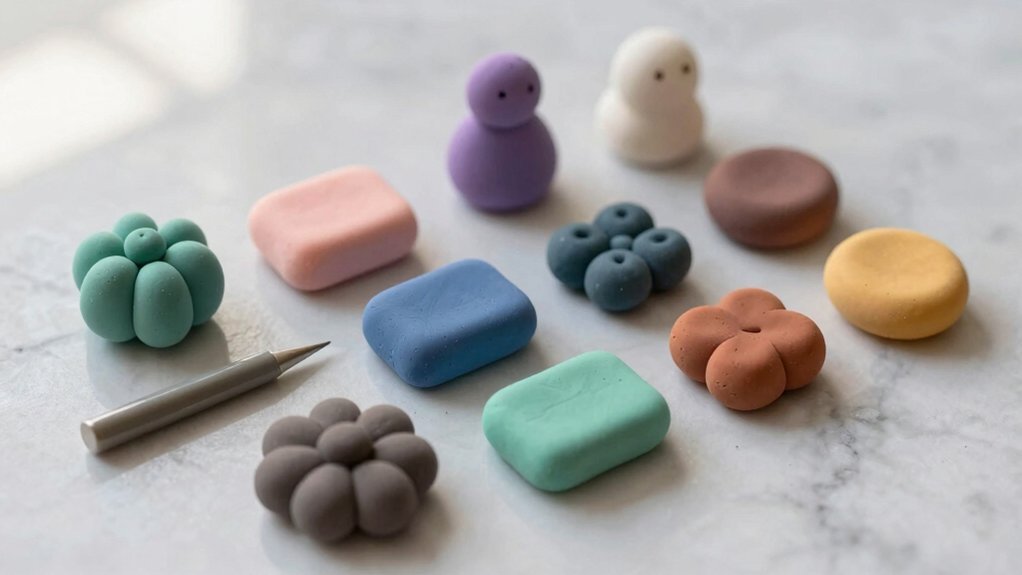
Leave a Reply